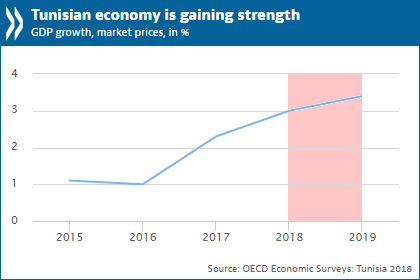Tunisia: New structural reforms needed to revive growth and job creation
The Tunisian economy is recovering, driven by good harvests and strong performance in the tourism sector, but further reforms are needed to ensure sustainable growth and higher living standards for all Tunisians, according to a new report from the OECD.

The first-ever OECD Economic Survey of Tunisia highlights the significant strides that have been made since the return to democratic rule, including increased participation in political processes, new freedoms of expression and association, a reduction in poverty rates and solid participation in global value chains. The Survey also points out, however, the substantial challenges posed by weak job creation, high unemployment and unsustainable public finances. It recommends structural reforms to speed up growth, boost employment, implement effective social policy and promote regional development.
The Survey, presented in Tunis by OECD Acting Chief Economist Alvaro Pereira and Tunisia’s Minister of Investment, Development and International Co-operation Zied Laâdhari, projects growth approaching 3% in 2018 and 3½% in 2019. It says the expansion will be driven by business investment, which is expected to benefit from simplified procedures from the new investment law, and resurgent exports, which will get a boost from the recovery in European markets.
“The Tunisian economy has shown great resilience to both internal and external challenges,” Mr Pereira said. “Reinforcing today’s economic recovery will require a quicker pace of reforms, with priority given to actions to improve the business environment. Job creation and regional development will be the keys to making the economy more efficient and more inclusive,” Mr Pereira said.
Returning public debt to a more sustainable path will require a combination of gradual fiscal stabilisation and structural reforms capable of sustaining stronger growth, the Survey said. As Tunisia’s tax-to-GDP ratio is already high, fiscal consolidation should focus on reducing public spending – including salaries and pension costs - over a medium-term horizon.
Tax justice can be reinforced through better efforts to combat tax evasion and fraud and the withdrawal of subsidies offered to wealthy households. Reinforcing the governance of state-owned enterprises and improving their financial performances will contribute to both stronger public finances and more efficient economy.
Speeding up the pace of structural reforms will be critical to future growth and job creation. This should include easing the regulatory, administrative and financing constraints facing businesses and creating a level playing field for public and private companies. Opening the economy to competition would boost investment and employment while speeding the dissemination of new technologies.
Better logistical performance and facilitation of external trade should make it possible to attract more foreign investment and to help Tunisian firms further integrate global value chains. The predictability of regulation, including tax regulation, will remain an important factor for investors.
Job creation and regional development will continue to be the key factors behind achieving more inclusive growth. Lightening tax burdens on formal employment – by financing some social benefits through general taxation – should be considered. Policies that promote women's participation in the labour market and their employment, and that provide better guidance on training courses that help ensure employment, should be implemented.
A new regional development policy is needed to capitalise on the specific advantages and economic opportunities offered in each region. Measures to encourage mobility, such as improvements to infrastructure and public transport in isolated regions and better housing policy, are also needed.
Source: Organization for Economic Co-operation and Development
- 360 reads
Human Rights
Fostering a More Humane World: The 28th Eurasian Economic Summi

Conscience, Hope, and Action: Keys to Global Peace and Sustainability

Ringing FOWPAL’s Peace Bell for the World:Nobel Peace Prize Laureates’ Visions and Actions

Protecting the World’s Cultural Diversity for a Sustainable Future

Puppet Show I International Friendship Day 2020

